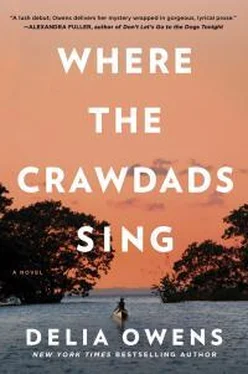But he’d let her brothers use it when he wasn’t, probably because they caught fish for supper. She had no interest in fishing, but maybe she could trade something else, figuring that was the way to reach him. Cook maybe, do more around the house, until Ma came back.
The rain eased. A single drop, here then there, shook a leaf like the flick of a cat’s ear. Kya hopped up, cleaned out the Frigidaire-cupboard, mopped the stained plywood kitchen floor, and scraped off months of caked-on grits from the woodstove burners. Early the next morning, she scrubbed Pa’s sheets, reeking of sweat and whiskey, and draped them over the palmettos. She went through her brothers’ room, not much bigger than a closet, dusting and sweeping. Dirty socks were piled in the back of the closet and yellowed comic books strewn next to the two soiled mattresses on the floor. She tried to see the boys’ faces, the feet that went with the socks, but the details blurred. Even Jodie’s face was fading; she’d see his eyes for an instant, then they’d slip away, closing.
The next morning, carrying a gallon can, she walked the sandy tracks to the Piggly and bought matches, backbone, and salt. Saved out two dimes. “Can’t get milk, gotta get gas.”
She stopped by the Sing Oil filling station just outside Barkley Cove, which stood in a grove of pines surrounded by rusted-out trucks and jalopy cars stacked on cement blocks.
Mr. Lane saw Kya coming. “Git on outta here, ya little beggar-hen. Marsh trash.”
“I got cash money, Mr. Lane. I need gas and oil for Pa’s boat motor.” She held out two dimes, two nickels, and five pennies.
“Well, it ain’t hardly worth ma trouble for such a piddly sum, but c’mon, give it here.” He reached for the bent-up, square container.
She thanked Mr. Lane, who grunted again. The groceries and gas weighed more with every mile, and it took some time to get home. Finally in the shade of the lagoon, she emptied the can into the gas tank and scrubbed the boat with rags and wet sand for grist until the metal sides showed through the grime.
• • •
ON THE FOURTH DAY after Pa left, she started keeping a lookout. By late afternoon a cold dread set in and her breathing shallowed up. Here she was again, staring down the lane. Mean as he was, she needed him to come back. Finally, in the early evening, there he came, walking the sandy ruts. She ran to the kitchen and laid out a goulash of boiled mustard greens, backbone, and grits. She didn’t know how to make gravy, so poured the backbone stock—floating with morsels of white fat—into an empty jelly jar. The plates were cracked and didn’t match, but she had the fork on the left, the knife on the right like Ma taught her. Then she waited, flattened up against the Frigidaire like a roadkill stork.
He banged the front door open against the wall and walked through the sitting room to his bedroom in three strides, without calling her or looking in the kitchen. That was normal. She heard him putting his case on the floor, pulling out drawers. He’d notice the fresh bedding, the clean floor for sure. If not his eyes, his nose would catch the difference.
In a few minutes he stepped out, straight into the kitchen, and looked at the set table, at the steaming bowls of food. He saw her standing against the fridge, and they stared at each other like they’d never seen each other before.
“Ah swannee, girl, what’s a’ this? Looks like ya went an’ got all growed up. Cookin’ and all.” He didn’t smile, but his face was calm. He was unshaven, with dark unwashed hair hanging across his left temple. But he was sober; she knew the signs.
“Yessir. I fixed cornbread too, but it didn’t come out.”
“Well, ah thankee. That’s a mighty good girl. Ah’m plumb wore out and hungry as a wallow-hog.” He pulled out a chair and sat, so she did the same. In silence they filled their plates and picked stringy meat from the stingy backbones. He lifted a vertebra and sucked out the marrow, fatty juice glistening on his whiskered cheeks. Gnawed on those bones till they were slick as silk ribbons.
“This here’s better’n a cold collard sandwich,” he said.
“I wish the cornbread’d come out. Maybe shoulda put more soda in, less eggs.” Kya couldn’t believe she was talking on so, but couldn’t stop herself. “Ma made it so good, but I guess I didn’t pay enough mind to the details . . .” Then thought she shouldn’t be talking about Ma, so hushed up.
Pa pushed his plate toward her. “’Nough for a dab more?”
“Yessir, there’s aplenty.”
“Oh, and tump some of that cornbread right in tha stew. Ah got a hankerin’ for soppin’ up the stock, and my bet is that bread’s just fine, mushy like spoonbread.”
She smiled to herself as she filled his plate. Who would’ve thought they’d find cornbread as a footing.
But now, after thinking about it, she worried that if she asked to use the boat, he would think she’d cooked and cleaned only for the favor, which was how it started out, but now seemed somehow different. She liked sitting down and eating like a family. Her need to talk to somebody felt urgent.
So she didn’t mention using the boat by herself, instead asked, “Can I go out fishin’ with ya sometime?”
He laughed hard, but it was kind. The first time he’d laughed since Ma and the others left. “So ya wanta go fishin’?”
“Yessir, I do.”
“You’re a girl,” he said, looking at his plate, chewing backbone.
“Yessir, I’m your girl.”
“Well, Ah might could take ya out sometime.”
The next morning, as Kya careened down the sandy lane, her arms held straight out, she sputtered wet noises from her lips, spittle spraying. She would lift off and sail over the marsh, looking for nests, then rise and fly wing to wing with eagles. Her fingers became long feathers, splayed against the sky, gathering the wind beneath her. Then suddenly she was jerked back to Earth by Pa hollering to her from the boat. Her wings collapsed, stomach pitched; he must have figured out she’d used it. She could already feel the paddle on her bottom and the backs of her legs. She knew how to hide, wait until he was drunk, and he’d never find her. But she was too far down the lane, in full view, and there he was standing with all his poles and rods, motioning for her to come. She walked over, quiet, scared. The fishing tackle was strewn about, a poke of corn likker tucked under his seat.
“Git in” was all he said as invitation. She started to express glee or gratitude, but his blank expression kept her quiet, as she stepped to the bow and sat on the metal seat facing forward. He pull-cranked and they headed up the channel, ducking the overgrowth as they cruised up and down the waterways, Kya memorizing broken trees and old stump signposts. He eased the motor down in a backwater and motioned for her to sit on the center seat.
“Go on now, scratch some worms from the can,” he said, a hand-rolled cigarette hanging at the corner of his mouth. He taught her to snag the bait, to cast and reel. It seemed he contorted his body in odd postures to avoid brushing against her. They only talked fishing; never ventured to other subjects, neither smiled often, but on common ground they were steady. He drank some likker but then got busy and didn’t drink more. At late day, the sun sighed, fading to the color of butter, and they may not have noticed, but their own shoulders finally rounded and their necks slacked.
Secretly Kya hoped not to catch a fish, but she felt a tug, jerked her line, and raised a thick bream, flashing silver and blue. Pa leaned out and snatched it in the net, then sat back, slapping his knee and yahooing like she’d never seen. She grinned wide and they looked into each other’s eyes, closing a circuit.
Читать дальше











